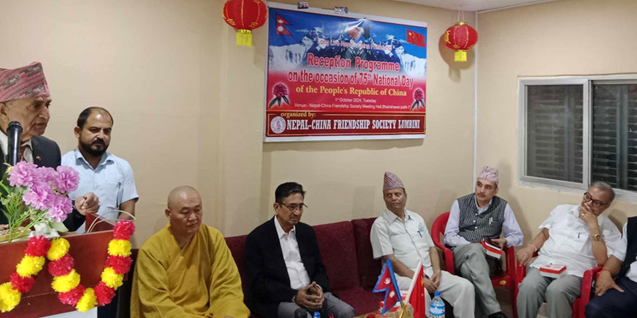https://www.risingnepaldaily.com/news/49859
The Rising Nepal,Wed, 2 October 2024

By A Staff Reporter,Kathmandu, Oct. 2 : Intellectuals and civil society activists have stated that Nepal has fallen far behind because it has failed to learn from the legacy of Chinese leadership and citizens uniting in favour of nationalism.
Speaking at an event organised by the Nepal-China Friendship Society Lumbini in Bhairahawa on the occasion of China's 75th National Day, they stated that despite Nepal's long-standing friendship and strong relations with China, the country has failed to emulate China's best practices.
According to Dr. Subarna Lal Bajracharya, Vice-Chancellor of Lumbini Buddhist University, China's political leadership and populace share a strong sense of nationalism. "The Chinese leadership and citizens have always been united in favour of nationalism, which is why they have made extraordinary progress in a short period of time compared to other countries in the world," he said and added, "However, the leadership and populace of Nepal are divided. Nepal has fallen far behind owing to the pattern of changing administrations and policies.”
In the past, China refused several foreign grants and loans and pursued growth on its own. According to Bajracharya, Nepal is being drowned in debt because of accepting grants and loans from donor nations to undertake development projects, which have resulted in losses. 'Natural resources and a favourable environment provide tremendous potential for economic success in Nepal. However, enormous foreign loans and subsidies have done little for Nepal," he said, adding that while Lumbini has the potential to draw millions of Chinese tourists through Buddhist philosophy and spiritual qualities, it cannot do so without a clear plan.
The chairman of the Nepal-China Friendship Society, Lumbini Narayan Prasad Sapkota, stated that China is a friendly and non-interfering friend of Nepal. Chairman Sapkota wished the Chinese government and people good health, longevity, and progressive living.
Nepali leaders have not yet learnt from the leadership of Mao Zedong, Deng Xiaoping, or current President Xi Jinping. President Xi has succeeded in pulling 750 million Chinese residents out of poverty and into prosperity, according to Sapkota.
He stated that since 2059 BS, the society has conducted exchanges with China on Chinese National Day and Chinese New Year in order to strengthen citizen-to-citizen connections.
Netra Panthi, a Constituent Assembly member, stated that while the Chinese are interested in boosting tourism in Nepal and Lumbini, Buddha's birthplace, Nepal has made no specific efforts to attract Chinese tourists. Yang Oh Shi, the Chief Abbot of the Chinese monastery at Lumbini, asked all Buddhists across the globe to visit Lumbini, since the Buddha's birthplace is a holy country and a land of peace to Chinese Buddhists.
Lumbini Development Fund Treasurer Siddhicharan Bhattarai, writer and scholar Boond Rana, Siddhartha Sahitya Parishad Chairman Dilliraj Bhattarai, writer Bijay Govinda Shrestha, Senior Vice President of the Society Govinda Regmi, and the Society's General Secretary Manish Joshi emphasised that Nepali authorities should make special arrangements to attract Chinese citizens to visit Nepal during the week-long holiday on Chinese National Day.
October 1 is National Day of China, and on this day, Beijing's main squares are decorated with flowers. On October 1, 1949, Chairman Mao Zedong proclaimed the People's Republic of China from the Tiananmen Square. Since then, National Day has been celebrated every year on October 1 to commemorate the establishment of New China.
The anniversary of the founding of the People’s Republic of China is celebrated in grand manner with a huge military parade in the Tiananmen Square area every ten years. Tiananmen Square is decorated with flowers every other year. In the middle of the Square, various artworks made from flowers can be seen spreading north and south. These flowers represent Greater China.